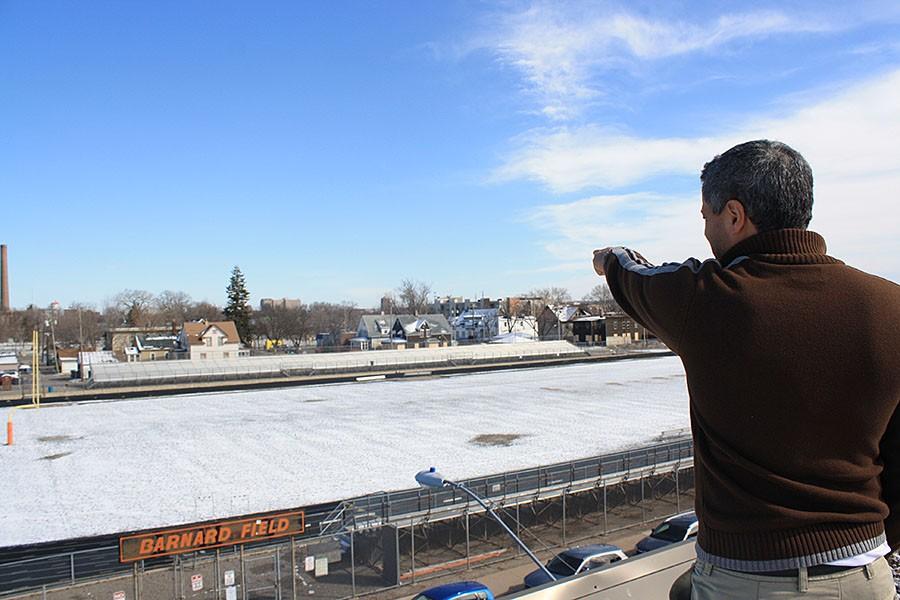Principal Ray Aponte gestures to the properties lining 21st street which the district has buying in anticipation of the relocation of the Transition Plus building. Aponte was initially excluded from the planning meetings, but he insists that his hopes for the future of South Athletics be considered in the process.
Aponte envisions the future of South athletics in block between South and Lake
Principal Ray Aponte stood at the edge of the third floor roof, looking out across the current athletic stadium and the houses and businesses between the alley and Lake Street. There he explained his vision for the property, which he called “Ray’s Dream.”
In “Ray’s Dream,” 31st Avenue is gone and the two blocks are fused together, creating one large campus. The stadium is spun and runs North to South. On the West side of the block there are various smaller facilities – still up in the air, but Aponte has some ideas, including a practice field for softball. A bike path winds through the campus.
He realizes that he will need to compromise this vision. The discussion about the land began when the district starting buying properties on the West side of 21st street. The plan is to buy and demolish these houses, clearing room for a new building that will house an adult education program, Transition Plus. Its students are young adults age 18-21 with special needs. They receive job training and life skills.
Aponte said that many South students attend Transition Plus after they graduate. He called the program “super needed.”
Transition Plus is currently located in the tan building near the Light Rail. According to a contract with the district, the cost to occupy the building will hike after 2018, so they plan to relocate. Lake Street is a central location
“I’m cool with whatever program, but you can’t just plop a building some place without considering the future of South High School,” he said.
In the upcoming months, a coalition including Aponte, Athletic director Brett McNeal, Ward 3 school board member Syad Ali, and Seward and Corcoran neighborhood organizations is negotiating the future of the property in a series of meetings.
Initially, the committee did not ask the input of the South administration, which frustrated Aponte. At the first meeting in March, he quickly asked that the vision for South’’s athletic expansion be included in the conversation.
“It was very very difficult for them to even hear me,” he sighed. “I’m just like ‘You guys, come on! You’re building right there and you don’t even want to have a discussion? I said this is ridiculous. They bought the argument.”
In November, before the project was introduced, a facilities team approached Aponte and offered to install astro-turf into the field. He rejected it offhand. “If we put in the astro-turf, they’re going to say we did something for South high school,” he explained. “You know, I’m not that naive….are you gonna buy me off with a little piece of candy? Nope!”
McNeal also refuses to be sold short on athletic facilities. He sees it as an equity issue. “When we have an opportunity to purchase property and land, we should be able to upgrade our athletic facilities and our school facilities to match and to rival our suburban counterparts,” he said.
“All of our athletic facilities are outdated,” said McNeal. “It’s not a secret.” For example, the cross country and track teams can’t practice or compete on the track. “It’s not a legal track field,” said Lynn Heldt, secretary of the athletic department. It is also notorious for giving athletes shin splints.
South spends $80,000 on travel for sports teams. Most of that is the cost of transporting players to far-away practice facilities every single day – and the majority of these are women’s teams.
“What would be nice is if we had the facilities and the space and save money and transportation by having those fields at our facilities. Softball, baseball, soccer lacrosse, ultimate frisbee field. We need that space,” said McNeal.
“Kids are leaving our school system and they’re telling us why they are leaving. There are better facilities in other places!” he said.
Aponte also sees this project as a chance to boost the women’s teams to the potential that they are already showing. “I think this could be our niche,” he said, referring to the success that the women are already having.
The Transition Plus building will be built by 2018, and the group hopes to have a plan by August. “Whatever they do is going to dictate the future of South High school. I’m just hoping they don’t cut us off,” he said.
